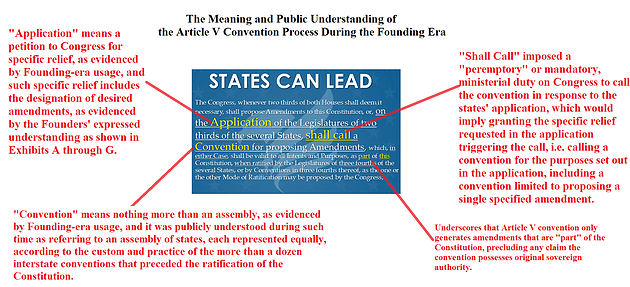This is part 8 of the 8 part series establishing that the laser-focus of the Compact for America approach to organizing an Article V convention with the specific job advancing and ratifying a pre-drafted, specific federal Balanced Budget Amendment is clearly, unequivocally, and overwhelmingly what the Founders expected from the state-originated amendment process.
The Meaning and Public Understanding of the Article V Convention Process During the Founding Era
States Can Lead
The Congress, whenever two thirds of both Houses shall deem it necessary, shall propose Amendments to this Constitution, or, on the APPLICATION of the Legislatures of two thirds of the several States, SHALL CALL a CONVENTION for proposing Amendments, which, in either Case, shall be valid to all Intents and Purposes, as PART of this Constitution, when ratified by the Legislatures of three fourths of the several States, or by Conventions in three fourths thereof, as the one or the other Mode of Ratification may be proposed by the Congress
“Application” means a petition to Congress for specific relief, as evidenced by Founding-era usage, and such specific relief includes the designation of desired amendments, as evidenced by the Founders’ expressed understanding as shown in Exhibits A through G.
“Shall Call” imposed a “peremptory” or mandatory, ministerial duty on Congress to call the convention in response to the states’ application, which would imply granting the specific relief requested in the application triggering the call, i.e. calling a convention for the purposes set out in the application, including a convention limited to proposing a single specified amendment.
“Convention” means nothing more than an assembly, as evidenced by Founding-era usage, and it was publicly understood during such time as referring to an assembly of states, each represented equally, according to the custom and practice of the more than a dozen interstate conventions that preceded the ratification of the Constitution.
“Part” Underscores that Article V convention only generates amendments that are “part” of the Constitution, precluding any claim the convention possesses original sovereign authority.
The preceding Exhibits A through G (Parts 1 through 7 of this series) overwhelmingly establish the laser-focus of the Compact for America approach on advancing and ratifying a specific amendment is four-square what the Founders expected from Article V. Simply put, the Founders clearly meant for the Article V convention’s agenda to be set in fine detail by the state legislative application that triggers the convention call, including the amendment to be proposed. With its multiple safeguards, the Compact approach ensures this happens in the real world, not merely as a matter of legal theory.
Does that imply that other less-focused Article V approaches are not what the Founders wanted?
Yes and no. On one hand, there is no doubt that James Madison opposed a broad agenda for an Article V convention. Madison’s opposition was clearly expressed in response to the State of New York’s efforts to qualify its ratification of the Constitution and later advance an Article V application that sought a convention with an agenda that would include roughly two dozen amendment topics. On the other hand, there is little evidence that other Founders were similarly concerned about a broad agenda. Moreover, there is no evidence that the Founders believed the states could not apply for a convention with a broad agenda if they wanted to. Further, Madison’s opposition to a broad agenda Article V convention during the Founding Era, when he was trying to shore up support for the Constitution, is not necessarily evidence of where the Founders would stand today.
Today, there is a plausible argument that the federal government has gone so completely off the rails that no one amendment or set of amendments can fix the problem, and that you need to seek to organize an Article V convention both to draft a wide range of solutions for the magnitude of the problem and to build consensus around them simultaneously.
We at Compact for America respect this argument. But most of us are not persuaded.
Most of the Compact for America team sincerely doubt that a genuine and peaceful consensus can be reached on the full spectrum of constitutional reforms needed to fix every significant constitutional problem. Such doubt is based on the fact that our society is divided 51-49 on most of the biggest pressing issues of the day.
At the same time, most of us freely admit the possibility we could be wrong, which is reason-enough to support to some extent even Article V efforts that seek to organize a convention with a broad agenda that could tackle every major constitutional problem. After all, we have increasingly little to lose. A convention of the states with a broad agenda is unlikely to succeed in killing the Republic before Washington does. And the political class can only kill the Republic once. Most of the Compact for America team believes there is nothing wrong with keeping the push for a broader agenda convention alive so that we can reconsider the need for comprehensive reform when the culture is more receptive to completing the job.
Still, rather than tackling every major constitutional problem all at once, Compact for America believes the most prudent way for the Article V movement to proceed is to give top priority to the most impactful reforms that already command supermajority support.
We should tackle constitutional problems one-by-one, not all at once.
We should change the political culture incrementally, but significantly, by focusing on the biggest points of policy leverage.
That is the judgment and the strategy behind the laser focus of the Compact for a Balanced Budget and the future Article V compacts that will be advanced as part of the Compact for America Initiative.
We hope you would agree, but not to the total exclusion of other worthy efforts.
If you agree, please like and share. And don’t forget: CFAEF President Nick Dranias and Executive Vice President Jeff Utsch are presenting the case for the Compact with complementary cocktails on February 10 at 3:30 p.m. in Tucson, Arizona! Details here.
[Originally published at Compact for America]




